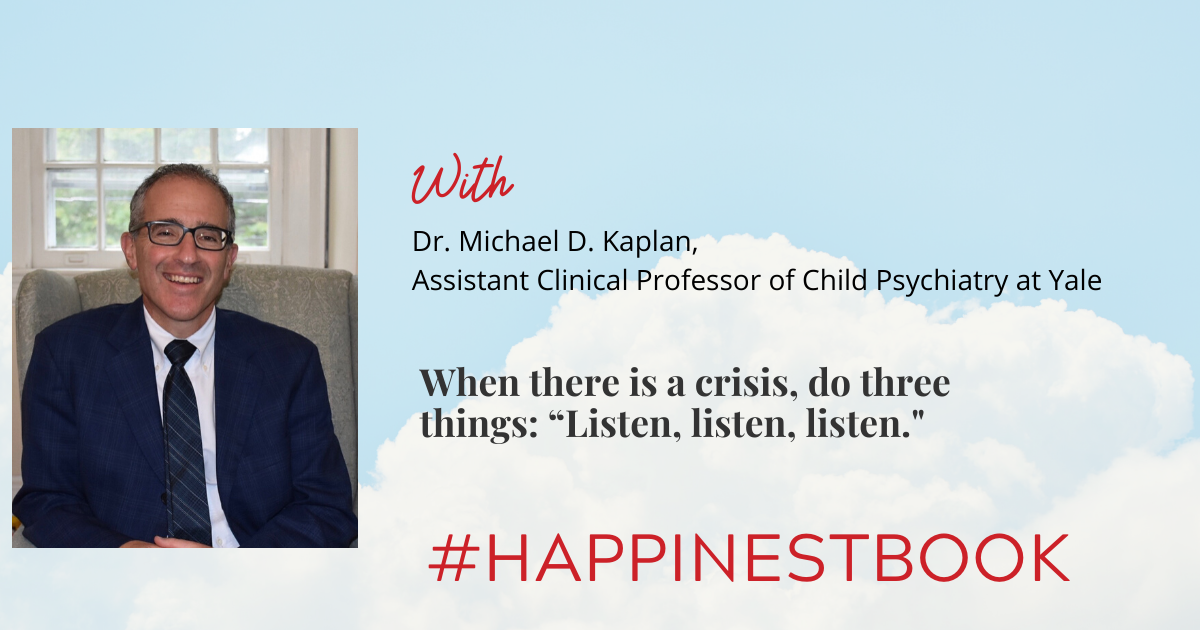Parents Today are more Invested in the Lives of Their Kids:How to be “Involved,” but not “Enmeshed” with Your Young Adults
Dr. Michael D. Kaplan is an assistant clinical professor of child psychiatry at the Yale School of Medicine. He sees children, young adults and parents at his practice in New Haven. He also is an advisor to professionals and parent groups about issues affecting children and families and a consultant to public and private schools in Connecticut.
He is a fountain of wisdom about relationships with young adults: For example, did you know that adolescents and young adults feel social rejection like it’s a death? If they get rejected by a friend, a romantic partner, a fraternity, it registers really high on the Richter scale. For them, “the world feels like it’s over.”
As seasoned adults, we take social rejection more lightly. We have had relationships throughout the course of our lives and are far less affected by social rejection. When we understand these types of differences, it can bring far greater understanding to our relationships with young adults. Today’s HappiNest episode is about letting go.
Did you like this episode? Please feel free to share it using the social media buttons below. I’d also be VERY grateful if you could rate, review, and subscribe to HappiNest on Apple Podcast, Spotify, Stitcher or Google Play.
What you’ll learn about in this episode:
- Our primary goal as parents is to launch our kids into independent lives so they are resilient and self-reliant. Parents play a major role in the separation and launching of a young adult.
- Parents have become far more invested in the lives of their children over the last 20 to 25 years. While kids benefit from these pro-active relationships, the process of separation has become more complicated.
- The key is to be “involved” with your kids, but not “enmeshed.” If the boundary between you and your child is clearly drawn, separation is easier on the parent and the child. A healthy separation “does not mean you abandon them or leave them permanently.” It’s a positive result when young adults are still asking for help, sharing joy and asking for advice. Those are “signs of a healthy empty nest.”
- The goal is to teach your fledglings skills rather than do it for them: For example, you might go with them to a bank to set up an account. Watch them as they are doing the task. If they need to register a car, you might go to the DMV with them the first time. Then make a list and stand back. “Become less of the quarterback and more of the coach on the side.”
- If your young adult is having trouble in college, you must allow them to advocate for themselves. Help them anticipate questions a dean or professor might have.
- When there is a crisis, do three things: “Listen, listen, listen.” It is likely your young adult can manage through it. Usually they call when there is a “raging fever.” When we have “an emotion mind,” we can’t think. What you want to do is “bring the temperature down by listening.”
- Use your “gut” instinct when it comes to your young adult’s well-being. Do you sense something is really awry? Are they sleeping and eating well? Are they engaged in normal activities? “If any of those things are going off the rails,” it’s time to intervene.
- Adolescents and young adults feel social rejection like it’s a death. If they get rejected by a friend, romantic partner or fraternity it registers high on the Richter scale. For them, “the world feels like it’s over.” As seasoned adults, we handle social rejection far better. We have the benefit of having navigated a lifetime of relationships.
- If your young adult is very upset, “don’t meet their level of agitation.” When young adults get upset over something, their blood pressure is “boiling.” “One way to lower that person’s temperature is to speak with a calm, steady voice, looking them in the eye.” Actively listen and emphasize. You might say, “that’s horrible,” or “that’s really bad,” to break the ice and help decrease the temperature. Don’t say “other people have it worse.” That’s throwing gasoline on the fire.
- Once you become an empty nester, remember that you are far from alone. Don’t feel guilty if you are secretly happy. “The unburdening of letting your child go is a wonderful feeling…You will feel happy and sad at times…Over time, the separation will begin to feel better and better.”
- Good news: Young adults become more interesting over time. You get to be an observer in their brain developing. They’ll come home and tell you things you haven’t learned.





